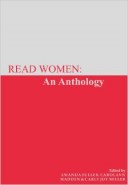
Book Review: Read Women: An Anthology Edited by Amanda Fuller, Carolann Madden, and Carly Joy Miller
Read Women: An Anthology
Edited by Amanda Fuller, Carolann Madden, and Carly Joy Miller
Locked Horn Press, 2014
ISBN-13: 978-0990359906
$19.95; 160 pp.
Reviewed by Louise Krug
Inspired in part by the #ReadWomen2014 twitter campaign, Read Women: An Anthology represents 32 female/genderqueer/transgender writers’ voices that showcase the best of contemporary women’s poetry. Locked Horn Press is a multi-genre publisher founded upon the idea that “any space in which conflict exists is an opportunity for new discovery and conversation,” which can be seen in this anthology, as the poems cover topics such as violence, survival, agency, race, sexual orientation, cultures, family, language, and living through big and small moments of difference.
At their best, these poems show us glimpses of these authors’ experiences, inviting the reader to engage in a learning one can only have through immersion in another’s life, if even for a moment. It is the variety of these 32 voices that lets the reader enter the life of another again and again and come out changed each time. In “Certified” by Luisa A. Igloria, the narrator clearly speaks:
Come sit and eat with me sometime — I’ll make
a meal from seeds and pith, a sustenance of green
and verve plucked raw from my own nerve. I steel
myself, passing through each turnstile, bending
through each furrow, threading the factory needle back
and back into a hundred collars and sleeves — Eyes
Evoking a sense of the narrator’s presence, the poem lets the reader enter the interior of her life and its struggles. This vividness of an individual’s life is also seen in Leah Lakshimi Piepzna-Samarasinha’s “airport ode #1”:
Once, on my way to a redeye from a performance, dressed in a cocktail dress
My searcher was a young brown queer woman
Who said damn, it’ll be easy to search you, you’re hardly wearing anything at all
She complemented my mukkuthi
and because I am a frequent queerartbrownlady flyer, she remembered me from
a week or two ago.
Other poems are less focused on relating an individual’s existence than on truth-telling, which has a way of making the particular general. This is seen in Stacey White’s “when I do not want to say anything about the bridges”:
this is a
town with diners. No ravens, no steeples
no hard rains. You wouldn’t have liked it
though you wouldn’t have known you didn’t.
..you cannot put your feet in the ocean without
money. You cannot learn or breathe without
money.
This pinpointing of such a particular emotion of not liking something but not being conscious of it is smart, thoughtful, and universal. Earlier in the poem are the lines
sometimes I imagine myself to the courtyard
of my high school. Everyone is named “jodie”
..or “rachel.” The boys smoke around the flagpole
with their milk cartons and long hair.
White takes a melancholy look at a familiar truth that is the bleak life as a teenager, but manages to identify how we are nostalgic about that time nonetheless.
The question of what it means to physically be a woman is tackled as well. In Valzhyna Mort’s “Sylt I”
Their father turns away to dry his cock
but the girls run their breasts and crotches openly,
their hands skilled at wiping tables,
their heads as big as the shadow of the early moon,
their nipples as big as the shadows of their heads,
and black so that their milk might look even whiter.
In this poem, women’s bodies are associated with domestic work (elsewhere is the line, “Bodies that make you think of women constantly chopping vegetables”), the hidden parts are seen, and the details of a woman’s anatomy are discussed as they so often aren’t.
In the introduction to the anthology, the editors discuss how the poetry of women is still often less visible than the poetry of men. They cite the VIDA count for a look at some statistics, and say that they felt compelled to bring the reader a collection of poetry that might make more visible that which is often less visible (women’s poetry) and filled with “wildness, love, domesticity, grief, and rebellion.” But it is after this that the most meaningful words are said, “More than anything, however, we hope this book will give you the chance to read the work of women you don’t already know, and to reconnect with the work of women you do.” It is those two services that anthologies like this one are the best at: providing the reader with a diversity of authors and the kinds of poems that a single collection never could. Anthologies also give the reader the gift of stumbling upon new authors to whom they connect with and begin to follow, as well as reminding them of old favorites. That this is a women’s collection is important and necessary, but more crucial is the placement of emerging and established authors side by side to show the expansion of this ever-changing tradition.
Louise Krug is the author of Louise: Amended (2012), a memoir about the brain surgeries she had when she was 22. She teaches creative writing and composition at the University of Kansas in Lawrence, Kansas, where she lives with her husband and daughter. Some of her recent work has appeared in River Teeth, Word Riot, Parcel and Huffington Post. She has a collection of essays forthcoming from 99:The Press in 2015.


Leave a Reply